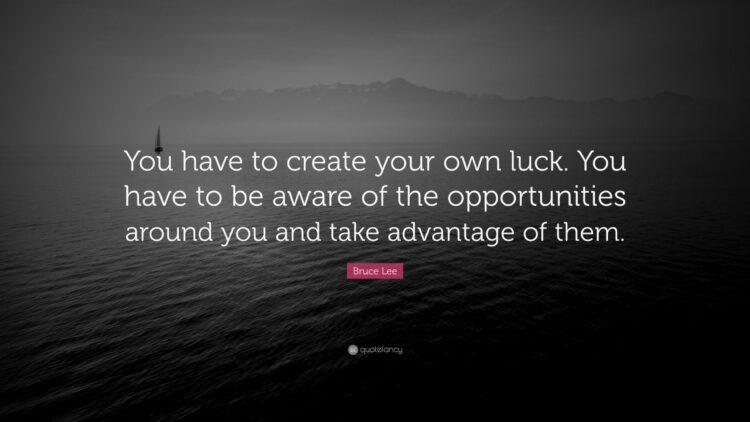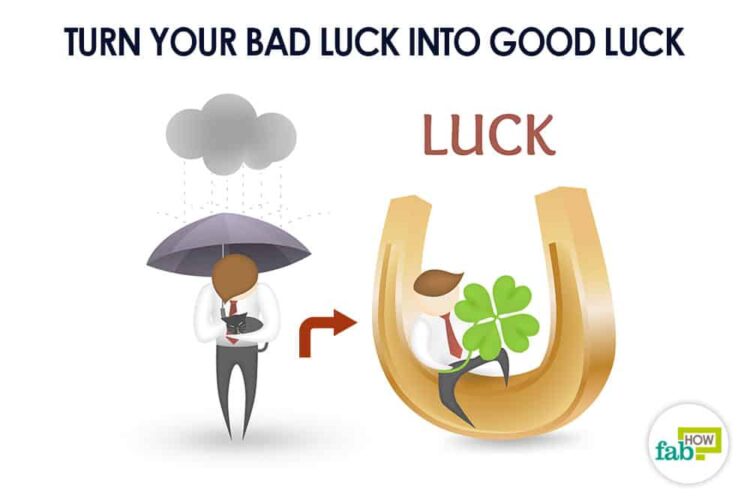 Does it seem to you like some people have a lot of stressors in their lives, whereas other people are just lucky, with good things just seeming to fall into their laps? Perhaps you, like many people, would like more luck too, believing that improved luck could change your life.
Does it seem to you like some people have a lot of stressors in their lives, whereas other people are just lucky, with good things just seeming to fall into their laps? Perhaps you, like many people, would like more luck too, believing that improved luck could change your life.
For many centuries, people have searched for ways to improve  their good fortune – lucky charms, lucky numbers, lucky rituals. Unfortunately, when tested out scientifically, lucky charms and rituals don’t work. Does this mean that there is nothing that we can do to change our luck? It just doesn’t seem fair!
their good fortune – lucky charms, lucky numbers, lucky rituals. Unfortunately, when tested out scientifically, lucky charms and rituals don’t work. Does this mean that there is nothing that we can do to change our luck? It just doesn’t seem fair!
Richard Wiseman is a British psychologist who calls himself a Professor of the Public Understanding of Psychology. Richard Wiseman has taken a scientific approach to studying luck, looking to determine whether he could find differences between people who were consistently lucky and those who encountered a lot of bad luck. He described his results in a book called “The Luck Factor”.
Wiseman advertised in newspapers and magazines, asking for people who considered themselves exceptionally lucky or unlucky to contact him. Over the years, he has studied people of all ages, from all walks of life, and has found, indeed, that some people did seem to be able to attract good luck consistently whereas others experienced much more bad luck. Wiseman didn’t believe that this could simply be a matter of chance, so he looked to find out whether there was something causing things to work out consistently well for some people and consistently poorly for others.

He concluded that, although lucky and unlucky people had little insight into the causes of their good and bad luck, there were definite differences between those two groups in terms of their thoughts and behaviours.

Some differences that he found between a lucky and unlucky life related to:
1) Maximising Chance Opportunities
Wiseman concluded that lucky people consistently encounter lucky opportunities because they think about and behave in ways that make them more likely than others to create, notice and act upon chance opportunities. Unlucky people tend to be more anxious, which can interfere with their ability to see and take advantage of potential good opportunities. Lucky people are more relaxed, outgoing and open. This helps them to become more aware of hidden opportunities. Instead of worrying about what might go wrong in a new situation, lucky people think “Isn’t that interesting? I’d like to give that a try?” and, therefore, expose themselves to new, potentially lucky, experiences. An example that Wiseman provided was the story of a man, who, at a party, instead of always talking to the same people, would think of a colour before he arrived and choose to speak only to people wearing that colour at the party, exposing himself to new people and potentially fortunate encounters. Lucky people are more likely to think outside the box, explore new things, stop at out-of-the way places, expect and look for opportunities to meet a potential new friend.
people think “Isn’t that interesting? I’d like to give that a try?” and, therefore, expose themselves to new, potentially lucky, experiences. An example that Wiseman provided was the story of a man, who, at a party, instead of always talking to the same people, would think of a colour before he arrived and choose to speak only to people wearing that colour at the party, exposing himself to new people and potentially fortunate encounters. Lucky people are more likely to think outside the box, explore new things, stop at out-of-the way places, expect and look for opportunities to meet a potential new friend.
2) Expecting Good Fortune
Lucky people are optimists, expecting that the future is going to be full of good fortune. These expectations  can become self-fulfilling prophecies by helping lucky people persist in the face of failure, and shape the way they interact with others. Because of this perseverance, even when faced with difficulty, lucky people do often achieve their goals. Lucky people’s expectations of good things happening are much higher than the expectations of unlucky people. If a lucky person encounters an unlucky event, they don’t change their expectations, they assume that their bad luck is short-lived. Unfortunately, if an unlucky person encounters a lucky event, they also don’t change their expectations, assuming that their good luck is short-lived. If you don’t buy a lottery ticket because you don’t expect to win, you can guarantee that you won’t win!
can become self-fulfilling prophecies by helping lucky people persist in the face of failure, and shape the way they interact with others. Because of this perseverance, even when faced with difficulty, lucky people do often achieve their goals. Lucky people’s expectations of good things happening are much higher than the expectations of unlucky people. If a lucky person encounters an unlucky event, they don’t change their expectations, they assume that their bad luck is short-lived. Unfortunately, if an unlucky person encounters a lucky event, they also don’t change their expectations, assuming that their good luck is short-lived. If you don’t buy a lottery ticket because you don’t expect to win, you can guarantee that you won’t win!
3) Turning Bad Luck to Good
Lucky people use various techniques to cope with bad fortune that comes their way. They imagine how  things could have been worse. For example, when asked to imagine themselves in a scenario involving a bank robbery where they were hit in the arm by a bullet, unlucky people think “Just my bad luck!!”, whereas lucky people think “It’s lucky because I could have been shot in the head”. Lucky people see the positive side of their bad luck, not dwelling on their ill fortune, but focusing on how it could have been much worse.
things could have been worse. For example, when asked to imagine themselves in a scenario involving a bank robbery where they were hit in the arm by a bullet, unlucky people think “Just my bad luck!!”, whereas lucky people think “It’s lucky because I could have been shot in the head”. Lucky people see the positive side of their bad luck, not dwelling on their ill fortune, but focusing on how it could have been much worse.
 Richard Wiseman created a “luck school”, taking the ideas he had derived from his research, and teaching people how to think and behave like a lucky person – creating and noticing chance opportunities, creating self-fulfilling prophesies by expecting good fortune, adopting a resilient attitude that turns bad luck into good. After attending luck school, 80% of the people who attended reported being happier and more satisfied with their lives. Unlucky people felt lucky and lucky people felt even luckier!
Richard Wiseman created a “luck school”, taking the ideas he had derived from his research, and teaching people how to think and behave like a lucky person – creating and noticing chance opportunities, creating self-fulfilling prophesies by expecting good fortune, adopting a resilient attitude that turns bad luck into good. After attending luck school, 80% of the people who attended reported being happier and more satisfied with their lives. Unlucky people felt lucky and lucky people felt even luckier!
Take care, and best wishes for your good luck!
Rhonda Gilby

